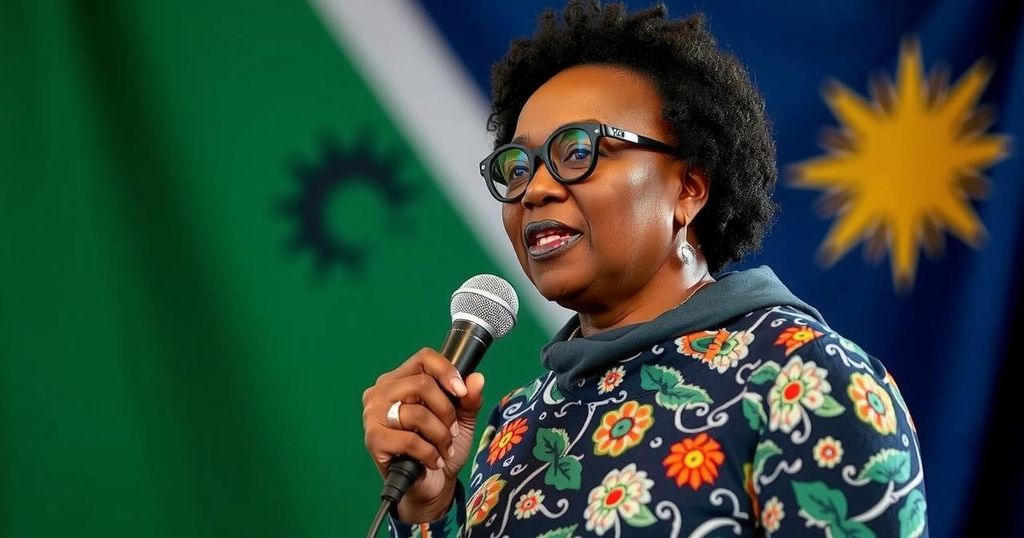Netumbo Nandi-Ndaitwah Elected as Namibia’s First Female President Amid Disputes

Namibia has elected its first female president, Netumbo Nandi-Ndaitwah, who secured 57% of the votes amidst disputed election results and technical complications. The Swapo party, despite losing some parliamentary support, continues its long-held governance. Opposition parties have rejected the election results, leading to potential legal challenges against the outcome, marking significant political shifts within the region.
Namibia has made history by electing its first female president, Netumbo Nandi-Ndaitwah, who was officially announced as the winner of the elections held last week. The ruling Swapo party has maintained its dominance, securing Nandi-Ndaitwah’s victory with 57% of the votes. This result defied forecasts suggesting a potential runoff. Nandi-Ndaitwah, who is 72 years old, has a background rooted in Namibia’s independence movement and has been serving as the vice-president. Following the passing of President Hage Geingob earlier this year, she was promoted from the position of foreign minister.
After the announcement of the results on Tuesday, Nandi-Ndaitwah expressed, “The Namibian nation has voted for peace and stability.” Although her victory marks a significant milestone, the elections faced serious challenges, including technical glitches and ballot paper shortages that forced officials to extend the voting period until Saturday. These complications led opposition parties to dispute the election results, alleging that the extension was illegitimate and asserting their intention to pursue legal avenues to contest the outcome.
In the race, opposition leader Panduleni Itula, who previously worked as a dentist in the UK, secured 25.5% of the votes, a decline from the 29% he received in 2019. While Nandi-Ndaitwah garnered a majority of votes, the Swapo party also saw a decrease in parliamentary support, achieving 53% compared to 65% five years prior, while Itula’s new political group, the Independent Patriots for Change (IPC), obtained 20% of the parliamentary vote. Nandi-Ndaitwah is regarded as a competent and experienced leader, maintaining a reputation unblemished by the corruption scandals affecting some Swapo members.
This election result is notably distinct from recent trends in southern Africa, where incumbent liberation movements have faced backlash from younger voters. In contrast to Namibia’s continued support for the Swapo party, both South Africa’s African National Congress and the ruling party in Botswana have experienced significant electoral losses in recent elections, highlighting a shift in political sentiments across the region.
Namibia gained independence from apartheid South Africa in 1990 and has been governed by the Swapo party since. With the recent election marking a historic moment in Namibian politics as it welcomes its first female president, the Swapo party’s governance has been both celebrated and contested. The country has witnessed socio-political dynamics where opposition parties have increasingly challenged the long-standing ruling party, especially in the face of emerging issues such as corruption and youth dissatisfaction with governance. The importance of this election extends beyond the immediate outcome, reflecting broader trends in Southern Africa regarding voter sentiment and the interplay between incumbent parties and emerging leaders.
The election of Netumbo Nandi-Ndaitwah as Namibia’s first female president symbolizes a significant milestone in the country’s political landscape while maintaining the longstanding rule of the Swapo party amidst certain challenges. The election results signal ongoing tensions between the ruling party and opposition, particularly in light of reported technical issues during the voting process. Nandi-Ndaitwah’s leadership is anticipated to navigate through the complex political landscape while upholding the principles of peace and stability endorsed during her campaign.
Original Source: www.theguardian.com







